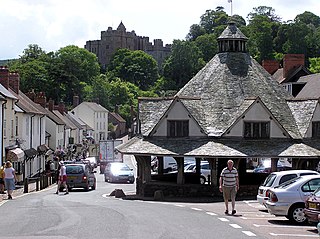
Dunster is a village, civil parish and former manor within the English county of Somerset, today just within the north-eastern boundary of the Exmoor National Park. It lies on the Bristol Channel coast 2.5 miles (4 km) south-southeast of Minehead and 20 miles (32 km) northwest of Taunton. The United Kingdom Census of 2011 recorded a parish population of 817.

The Parish church of St Michael the Archangel is in the village of Compton Martin, Somerset, England. The church is a grade I listed building, and several of the monuments in the church yard also have listed status., The church is dedicated to St Michael the Archangel.

The Grade I listed buildings in Somerset, England, demonstrate the history and diversity of its architecture. The ceremonial county of Somerset consists of a non-metropolitan county, administered by Somerset County Council, which is divided into five districts, and two unitary authorities. The districts of Somerset are West Somerset, South Somerset, Taunton Deane, Mendip and Sedgemoor. The two administratively independent unitary authorities, which were established on 1 April 1996 following the breakup of the county of Avon, are North Somerset and Bath and North East Somerset. These unitary authorities include areas that were once part of Somerset before the creation of Avon in 1974.

The Church of St Mary Magdalene in Chewton Mendip, Somerset, England, was built in the 1540s and has been designated as a Grade I listed building. It is dedicated to Jesus' companion Mary Magdalene.

The Church of St Mary in central Yatton, Somerset, England, is often called the Cathedral of the Moors due to its size and grandeur in relation to the village. It has been designated by English Heritage as a Grade I listed building.

The Church of St Mary the Virgin in Nettlecombe, Somerset, England dates from the 13th and 14th centuries, and has been designated as a Grade I listed building.
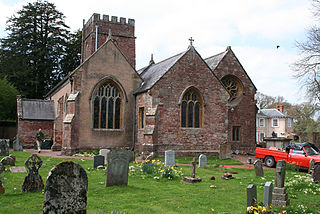
The 'Church of All Saints in Nynehead, Somerset, England dates from the 14th century and has been designated as a Grade I listed building.

Taunton Minster is a Church of England parish minster church in Taunton, Somerset, England, dedicated to Jesus' companion Mary Magdalene. It was completed in 1508 and is in the Early Tudor Perpendicular Gothic style. It is designated as a Grade I listed building. It is notable for its very tall tower.

The Church of St George in Ruishton, Somerset, England was built in the 14th to 16th centuries and has been designated as a grade I listed building.

The Anglican Church of St Mary in West Buckland, Somerset, England has 13th-century origins and has been designated as a Grade I listed building.
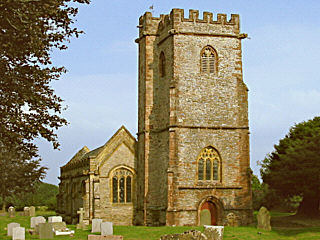
The Church of St Mary & All Saints in Broomfield, Somerset, England was built in the 15th and 16th centuries and has been designated as a Grade I listed building.
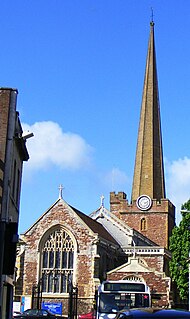
The Church of St Mary in Bridgwater, Somerset, England was built in the 13th century, and has been designated as a Grade I listed building. It is dedicated to Saint Mary, the Virgin. The first vicar was recorded c1170
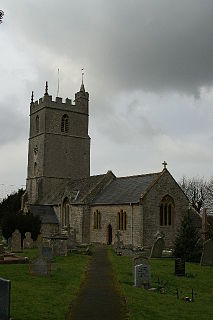
The Church of St Mary in Woolavington, Somerset, England has 11th-century origins and is a Grade I listed building.

The Church of the Blessed Virgin Mary in Huish Episcopi, Somerset, England has 12th-century origins, but was largely rebuilt in the 14th, 15th and 16th centuries. It has been designated as a Grade I listed building.
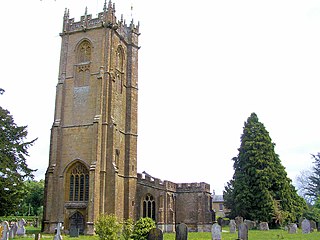
The Church of St George in Hinton St George, Somerset, England includes 13th-century work by masons of Wells Cathedral, and has been designated as a Grade I listed building.
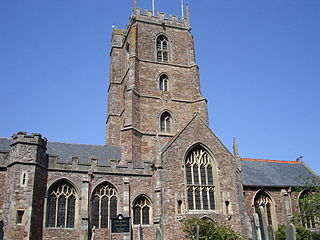
Dunster Priory was established as a Benedictine monastery around 1100 in Dunster, Somerset, England.

The Church of St Bartholomew in the parish of Yeovilton, Somerset, England, was built around 1300. It is a Grade II* listed building.

The Church of St Catherine is an Anglican parish church in St Catherine, Somerset, England. It was built in the 12th century as a chapel of ease of Bath and has been designated as a Grade II* listed building.

Christ Church in Clevedon, within the English county of Somerset was built between 1838 and 1839 by Richard Charles Hussey and Thomas Rickman and revised by George Phillips Manners and John Elkington Gill in the 1850s. It is a Grade II* listed building.

The Anglican Church of St Michael and All Angels at Rowberrow within the English county of Somerset dates from the 14th century, but parts were rebuilt in 1865. It is a Grade II* listed building.






















